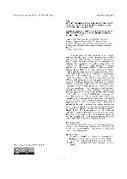ASPH inhibition reveals differential gene expression patterns in HPV-positive and HPV-negative cell lines

Author
Kasi, Murtaza Khan
Publication date
2024Published in
Czech Chemical Society Symposium SeriesPublisher / Publication place
Česká společnost chemickáVolume / Issue
22 (6)ISBN / ISSN
ISSN: 2336-7202ISBN / ISSN
eISSN: 2336-7210Metadata
Show full item recordCollections
Abstract
Cancer is associated with alterations in key cellular pathways, including the aspartate ββ-hydroxylase (ASPH) pathway, an oncogene upregulated in various carcinomas that plays a crucial role in tumor progression and metastasis. To elucidate the mechanisms of ASPH oncogenicity, we examined the effects of ASPH inhibition in human papillomavirus (HPV) HPV)-positive (CRL CRL-3240, HeLa) and HPV HPV-negative (FaDu, MCF MCF-7) cell lines. Inhibition of ASPH's catalytic activity using the small molecule inhibitor MO MO-II-1151 resulted in a significant reduction in proliferation, migration, and invasiveness of these tumor cells.Transcriptome analysis via bulk RNA sequencing revealed 2387 and 2350 differentially expressed genes in hypoxic and normoxic conditions, respectively, compared to controls.Notably, 1460 genes in hypoxia and 1325 in normoxia were significantly downregulated, particularly those involved in cell cycle regulation, DNA replication, and epithelial epithelial-mesenchymal transition (EMT). RT RT-qPCR validated the downregulation of key genes (IL7R, LY6D, LY6E, LY6K, TRIP13, SUV39H1, ELAVL2, WNT10B) in at least three cell lines. The interleukin 7 (IL7) receptor gene (IL7R) was consistently downregulated across all cell lines. IL7R, shared by the IL7 and thymic stromal lymphopoietin (TSLP) receptors, interacts with JAK1/3 and JAK1/2 through their intracellular domains. Western blot analysis showed that MOMO-II-1151 or tofacitinib (a Janus kinase inhibitor) reduced key JAK/STAT pathway components, including JAK2/3, STAT5, BCL BCL-2, MCL1, and cyclin D1 in CRL CRL-3240 and HeLa cells, indicating that ASPH inhibition primarily targets the JAK/STAT pathway via IL7. These findings suggest the potential of targeting IL7/TSLP receptor signaling and ASPH activity as therapeutic strategies in cancer treatment.
Keywords
HPV, cancer, ASPH
Permanent link
https://hdl.handle.net/20.500.14178/2663License
Full text of this result is licensed under: Creative Commons Uveďte původ 4.0 International




